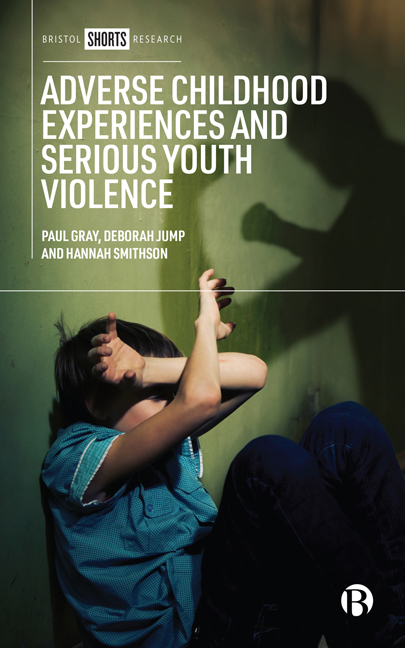Book contents
- Frontmatter
- Contents
- List of Figures and Tables
- Acknowledgements
- One Introduction
- Two Review of the Literature
- Three Researching Adverse Childhood Experiences and Trauma
- Four Serious Youth Violence
- Five Adverse Childhood Experiences
- Six The Relationship between Adverse Childhood Experiences and Serious Youth Violence
- Seven Trauma-informed Practice
- Eight Conclusions
- Notes
- References
- Index
Five - Adverse Childhood Experiences
Published online by Cambridge University Press: 18 January 2024
- Frontmatter
- Contents
- List of Figures and Tables
- Acknowledgements
- One Introduction
- Two Review of the Literature
- Three Researching Adverse Childhood Experiences and Trauma
- Four Serious Youth Violence
- Five Adverse Childhood Experiences
- Six The Relationship between Adverse Childhood Experiences and Serious Youth Violence
- Seven Trauma-informed Practice
- Eight Conclusions
- Notes
- References
- Index
Summary
Prevalence of adverse childhood experiences
When compared to young people in general, those entering the justice system are much more likely to have experienced childhood adversity. As outlined in Chapter 2, studies in both the USA (Duke et al 2010; Dierkhising et al 2013; Baglivio et al 2014; Fox et al 2015) and the UK (Boswell 1996; Jacobson et al 2010; Her Majesty's Inspectorate of Probation 2017; Martin et al 2021) have consistently shown that adverse childhood experiences (ACEs) are disproportionally prevalent among young people involved in the justice system. For example, Martin et al (2021) found that young people entering the secure estate were twice as likely as young people in the general population to have experienced one or more ACEs, and over 13 times more likely to have experienced four or more. With this in mind, it was unsurprising that all of the youth justice workers interviewed for this research noted the high prevalence of ACEs among the young people they work with. They noted how rare it was for the assessment tool (see Figure 3.1) to show only one or two of the ten ACEs, with most young people assessed having many more:
Youth justice worker [YJW] 6:Looking at my cases, … most of them have more than four or five individual traumas.
YJW 5: I think I’ve had one [young person] with two [ACEs], but that's it. The rest of them are quite high, sixes and sevens.
YJW 10: All my young people … have experienced ACEs. All of them have had at least eight or more.
The interview findings were supported by the data collected using the ACEs assessment tool. As can be seen in Figure 5.1, over three quarters (78 per cent, n= 155) of the young people who were assessed had an ACE score of four or more. Indeed, over a fifth (22 per cent, n= 43) had a score of eight or more, and three young people had all ten ACEs. Only two of the young people assessed had no recorded ACEs. The average ACE score for the sample was 5.38, with a standard deviation of 2.41.
- Type
- Chapter
- Information
- Adverse Childhood Experiences and Serious Youth Violence , pp. 54 - 68Publisher: Bristol University PressPrint publication year: 2023



